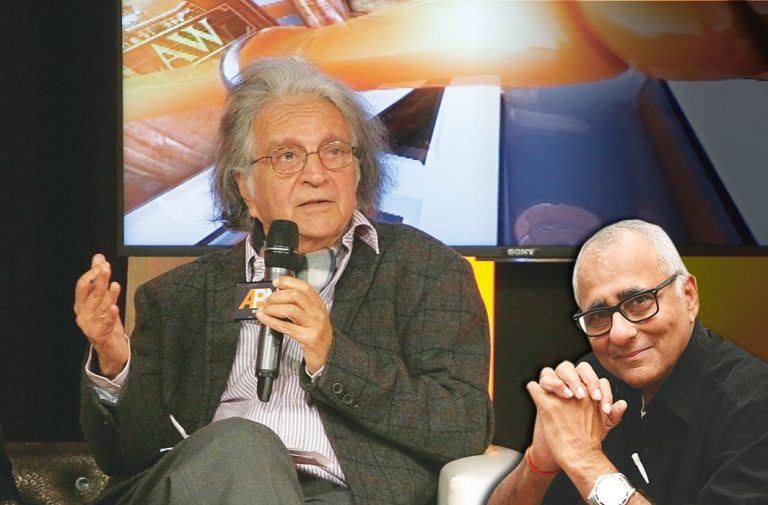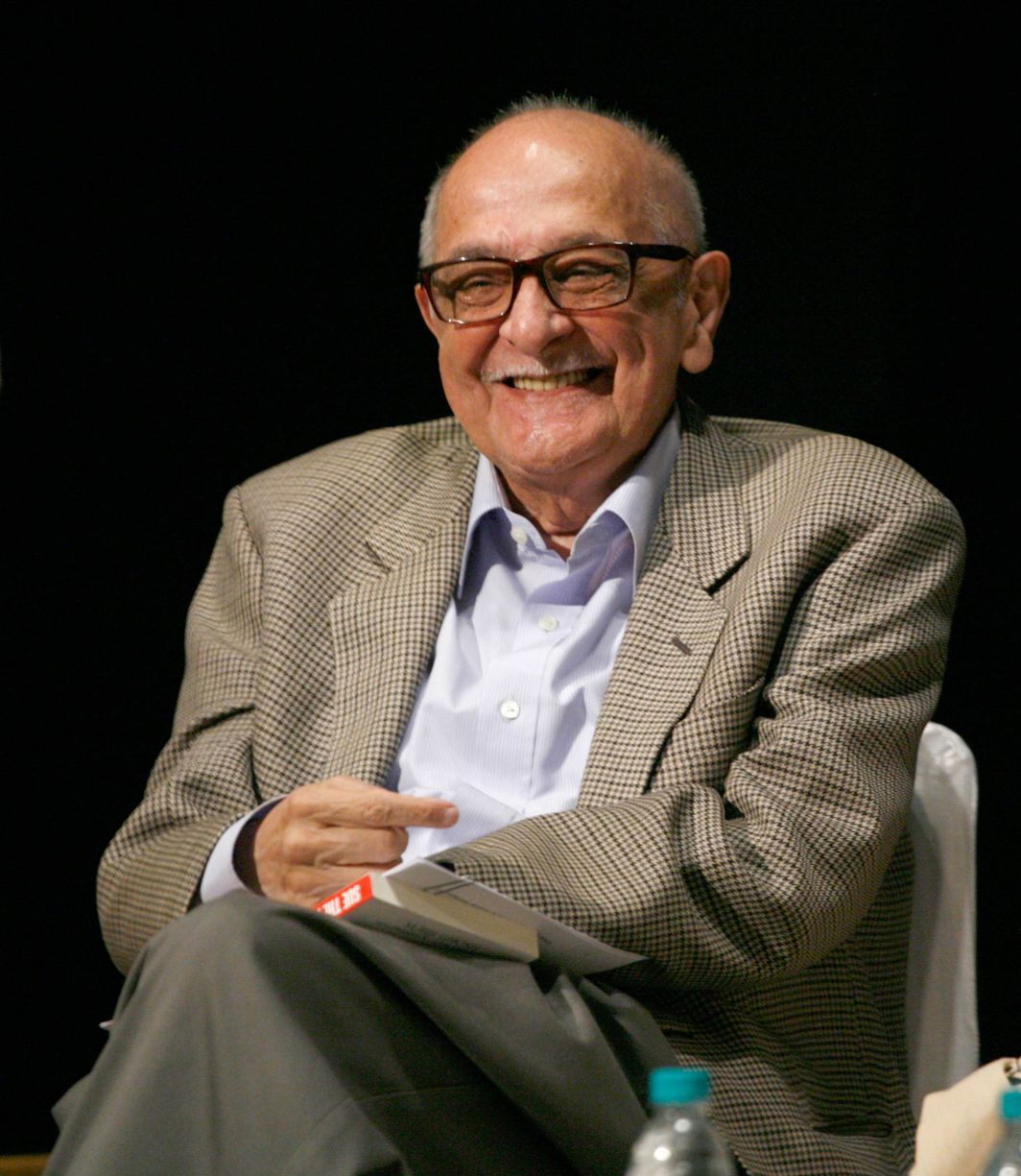
~By Inderjit Badhwar
Every day in the weekly life cycle of India Legal is special. Who knows what news will come tumbling out of the courts at any given moment? Expectancy nourishes excitement. But there are always some days which are more singular than others. And last week there occurred one such special occasion. The evergreen jurist Upendra Baxi, the penultimate man for all seasons, paid a long visit to our editorial offices to be part of an informal conclave in which he regaled the participating judges, constitutional luminaries, journalists and senior lawyers with anecdotes and flourishes of legal lore.
Baxi is a one of a kind. He is flagrantly and fearlessly liberal. He is what the Americans call a “strict constructionist” of the Constitution for whom liberty, far from being a vague precept of political philosophy with little practical value to the toiling masses, is in effect, a living embodiment of their sovereignty in pursuit of a life which need not necessarily be nasty, brutish and short.
For the unlettered, (forgive my presumptuousness), a brief introduction to Baxi should suffice. He is an incorrigible, indomitable scholar, having served as vice-chancellor of Delhi University, taught in the US at Duke and UCLA, and is a professor at the University of Warwick in the UK. Look only at the titles of some of his works and you’ll have a fair idea of where, as the saying goes, Baxi’s head is at: Voices of Suffering, Fragmented Universality, and the Future of Human Rights; The Development of the Right to Development; From Human Rights to the Right to be Human: Some Heresies.
During his interaction at India Legal, an account of which appears elsewhere in this issue, Baxi was typically irreverent in his approach to the so called “judges’ revolt” in the Indian Supreme Court. He told us such crises are always welcome. They are a catharsis from which, ultimately, arise the solution of problems often swept under the rug and left to fester.
Ever the gadfly, the scholar has held forth on some of the most controversial issues which have plagued and sullied the nation’s affairs throughout its modern political history. He has been a vociferous critic of the suppression of the right to dissent.
But this does not pit him against the legitimately constituted authority of the right of a state to govern with resolve. He balances the scales, because he is no champion of anarchy which is a fertile breeding ground for despots and the emergence of demagogues and oligarchs. As a paper published by the Symbiosis Law School puts it, Baxi believes that constitutionally, sincere citizens agree on two things: First, any assailant of unity, integrity and democratic sovereignty ought to be dealt with according to the law; and second, intimidation and violence, especially aggression or predation-moral vigilantism of any sort have no place in any pursuit of rashtra bhakti.
In Kedar Nath Singh v. State of Bihar, the Supreme Court made it clear that allegedly seditious speech and expression may be punished only if the speech is an “incitement to violence or public disorder”. Further the Court also stated that Section 124 A (the anti-sedition section of the Indian Penal Code) is not unconstitutional and not violative to Article 19(1)(a) of the Constitution. Thus, words and speech can be criminalised and punished only in situations where it is being used to incite mobs or crowds to violent action. Mere words and phrases by themselves, no matter how distasteful, do not amount to a criminal offence unless this condition is met.

Baxi has supported this contention: “Sedition should never be a way of governance of dissent. Our Supreme Court has ruled early that every citizen has a right to discuss and dissent; only incitement to violent or criminal action stands outlawed. Shouting slogans that are not anti-Indian, and conducting and joining protest marches, are regarded by the court as an integral aspect of freedom of speech and expression and democratic dissent. Freedom of speech is now seen as the touchstone of democracy, and the ability of individuals to criticise the state is crucial to maintaining freedom.”
Perhaps some of the most memorable lines that Baxi will be remembered for concern his passionate outrage over the Bhopal gas disaster in which some half a million people were ex-posed to leaking MIC gas from a Union Carbide plant in December 1984. Over a period, the death toll is estimated at anywhere between 5,000 and 8,000 with as many disabilities.
Baxi’s target was none other than another iconic jurist Fali Nariman who defended Union Carbide in court. Nariman’s memoir, Before Memory Fades, records an exchange with his peer with uncanny candour. The occasion was Seminar magazine asking them to use its editorial platform for an exchange of views on the 20th anniversary of the gas disaster in December 2004.
Nariman had written: “In toxic torts, anger against the industrial enterprise believed to be responsible is infectious, evoking strange responses. Affluent sections of society unaffected by the tragedy—who share the rage of the victims—themselves do nothing to alleviate the loss; they have heard people and the press repeatedly say that retribution must come from the wrongdoer: the industrial or chemical company must be compelled to pay. This results in a climate of opinion which favours the view that only victims of natural disasters require public help and support: as to others, the polluter (the perpetrator) should pay.”
This point of view was shared by the Supreme Court in cases stemming from the Bhopal gas case. In accepting the civil settlement reached in February 1989 between the Union of India, representing the victims, and Union Carbide, the Court averred: “It is indeed a matter for national introspection that public response to this great tragedy which affected a large number of poor and helpless persons limited itself to the expression of understandable anger against the industrial enterprise but did not channel itself in any effort to put together a public-supported relief fund so that the victims were not left in distress, till the final decision in the litigation. It is well-known that during the recent drought in Gujarat, the devoted efforts of public spirited persons mitigated, in great measure, the loss of cattle-wealth in the near famine conditions that prevailed.”
Baxi protested furiously. He responded with a public letter to Nariman: “I had to regretfully decline the invitation to contribute to the Seminar (December 4 issue)… because of my resolution not to share any public platform with Fali Nariman ever since he assumed the UCC advocacy. I now make an exception because even some movement colleagues have read his contribution here as offering a veiled apology for his advocacy of an unjust cause and an unscrupulous client. No close reading of what he now says remains necessary to dispel this strangely erroneous impression. Instead, what we really get here is an elaborate apologia for the unconscionable settlement that he so assiduously actually promoted.”
After several exchanges, Baxi wrote a poignant letter to Nariman, starting with “Dear Fali”, which Nariman chivalrously reproduced in his memoirs, recorded by Sundeep Dougal in Outlook, in a perspicacious recounting of the duel between the two gentle giants. Wrote Baxi:
“Honest differences of opinion in the Indian public culture almost all too often remain mired and caricatured, often cruelly, in terms of personalized politics, a tendency that I have combated all through, perhaps unsuccessfully in my associational public life in India…”
He added: “…I sincerely believe (and you may equally sincerely believe that I remain mistaken) that your active defence of the UCC did a great harm to the protection and promotion of human rights. To say this is not to attack in any way your otherwise impeccable personal and professional credentials. Fali, you may say that the matters end where your professional conscience begins. If more than 2,00,000 Bhopal victims and those acting on their behalf think otherwise, don’t they also deserve the dignity of equal respect?”
He concluded: “I can only guess what you actually know in terms of the ringside view of settlement orders. Obviously, we differ profoundly, concerning the architecture of judicial perfidies or performance. I had hoped that your response, twenty years after, would at least have been consistent to your understanding of human rights responsibilities of a human rights lawyering, long since released of professional privilege. Even state archives remain unprotected by a thirty year requirement of official disclosure. I must now await a decade of life, against all available health evidence to the contrary, of how the settlement orders eventually were accomplished. But activist lifetimes, even when perishable, hopefully have an appeal be-yond individual longevity. I hope that future archival retrieval will respond much better to the many issues of contention between us.
“What a long way of saying ‘Thanks’, Fali, for your animated rejoinder!
“Much love to Bapsi {Mrs Nariman} and you,
Upen”
Nariman responded obliquely, leaving Baxi to have his final say. He referred to lines from Oliver Cromwell, the 17th century Lord Protector of England, as quoted in Anecdotes of Painting in England (1763) by Horace Walpole. While commissioning a portrait of his, Cromwell advises the artist: “Mr Lely, I desire you would use all your skill to paint my picture truly like me, and not flatter me at all; but remark all these roughnesses, pimples, warts, and everything as you see me, otherwise I will never pay a farthing for it.”
Those were testing times for the Supreme Court, but the debate, no matter how sharp-edged, remained civilised, so far removed from the epithets and vulgar dissonance which mark today’s polarised India often dripping with hate. The Supreme Court, indeed the legal system, faces a crisis today. As Pratap Bhanu Mehta wrote: “For all its thunderous bluster, the Supreme Court has to constantly reclaim its legitimacy.”
Thank the Lord that India is blessed with children like Fali and Upen who, like Diogenes holding a lantern to the faces of citizens of Athens, continue their search for honesty, probity, and enlightening, liberating discourse.
—Inderjit Badhwar is Editor-in-Chief, India Legal.
He can be reached editor@indialegallive.com

